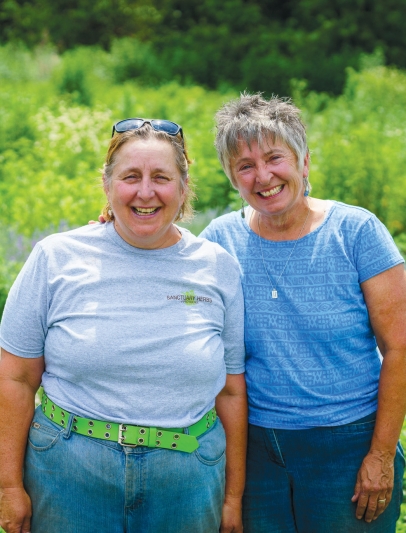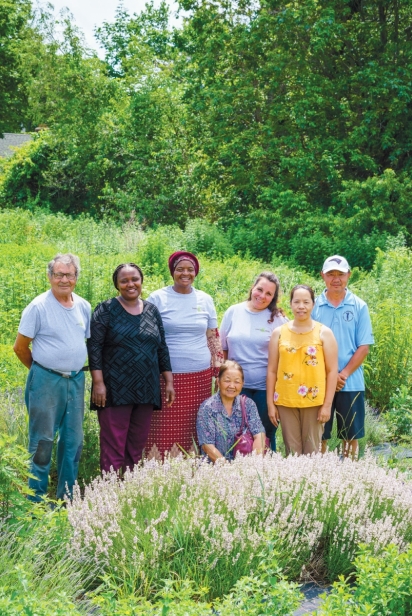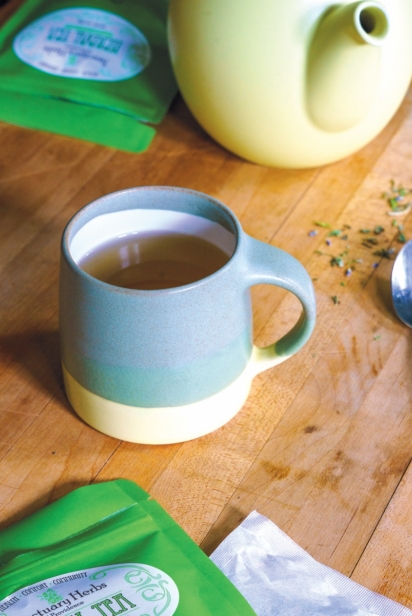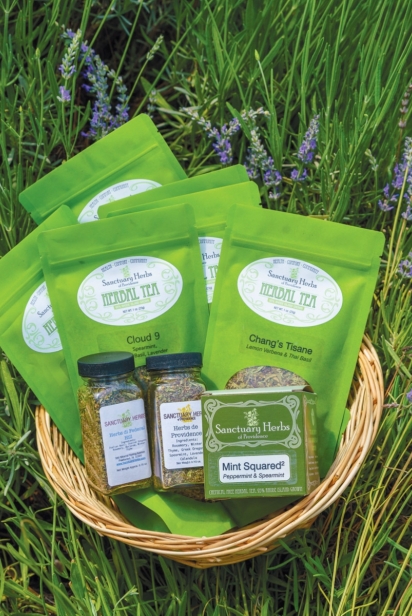Sanctuary Herbs Celebrates Diverse Community of Farmers
Farm-to-Cup Teas and Culinary Herbs Help Bolster Small-Farm Viability
Aromatic sage, lemon verbena, catnip and chocolate mint are but some of the chemical-free herbs grown for Rhode Island— based Sanctuary Herbs. The herbs delight the senses and the names of the teas and culinary herb mixes pique one’s curiosity: Top-selling teas include Cloud Nine and Glitter, while Herbs de Providence and Basil Melange are among customers’ favorite culinary herb mixes. Most of the seven or so farmers growing these herbs come from the Azores, the Republic of Burundi, Laos, Rwanda and beyond; a few are Rhode Islanders.
It was the 2016 presidential election cycle’s anti-immigrant rhetoric that inspired former Southside Community Land Trust colleagues Christina Dedora and Eliza Sutton to create the company (Eliza has since moved on from Sanctuary). Says Christina, “At my farm, Blue Skys at Urban Edge Farm, I grow herbs for Sanctuary, as do many of the farmers who have been our friends for many years, including Chang Xiong, Philip and Vue Yang, Nhia Lee and others.” Several farmers also grow herbs at other locations.
In a nod to local politics, Sanctuary’s culinary herb mixes include Buddy Blend, named for former Providence Mayor Buddy Cianci, who certainly kept life flavorful, and Freedom Blend, for Roger Williams’ quest for religious liberty. A tea, Gina Goes to Washington, was created after Governor Gina Raimondo became the Biden administration’s Secretary of Commerce.
More than 45 years ago, Manny Costa left his good life and good job in the Azores to be closer to his wife’s family in the United States. Some eight years ago, he began growing herbs. These days, he grows peppermint, spearmint, chocolate mint, catnip and lemon balm and garbles nearly 90% of Sanctuary’s herbs. “Garbling” is the time- and labor-intensive process of removing the leaves from the stems after the herbs have dried.
“I come in [to Sanctuary’s drying room in Pawtucket] at 2:30 am to garble the leaves and leave at 5:30 am,” says Manny. Then, he goes home and weeds his garden that is home to two 30-year-old fig trees. Later, he eats breakfast, works in another garden for several hours, eats lunch and enjoys an afternoon nap.
What’s his message for staying so active?
“I like to be busy; I do this work mostly for pleasure,” he says. “I keep an open mind and always talk to people. I teach what I know and learn what others know.”
“Manny taught me,” says Director of Operations Cheryl Dedora-Pynn, Christina’s older sister, “that you have to love what you do. That has resonated for me.”
Their farmers, who also grow and sell produce at other venues, are paid $3 per pound for most of the herbs they grow. “We provide a guaranteed income to our farmers; they grow herbs and we pay them. Part of our mission is to make sure that they are paid a fair price,” says Christina, who grows herbs, flowers and tomatoes at Blue Skys Farm. “I don’t believe farmers growing herbs overseas get paid well.”
Early financial support and consulting advice from Katherine Brown (former Southside Community Land Trust executive director), Myrna Adolfo and the Dedoras’ late sister Cathy were invaluable. Now, five years later, “the steepest challenge is speed and efficiency; time is money,” says Cheryl.
With significant competition in the tea market and Sanctuary’s need for new customers, Christina says, “I’ve grown herbs for many years, but now there’s an explosion of herbal teas. It’s all about volume.”
Seven Stars Bakery, Madrid European Bakery & Patisserie, Belmont Market and Olive Del Mondo are among Sanctuary’s 50 wholesale customers; Sanctuary’s teas and culinary herbs are also available online and at some farmers markets.
“We’re always looking for more customers,” says Christina. “If you’re going to drink herbal tea, try to buy local, for the quality of the herbs.”
Word of mouth is the best way to get new customers, says Cheryl. “You’re only as good as your last cup of tea.” Though cold-calling wholesale customers during Covid-19 was a non-starter, Farm Fresh RI’s Mobile Market was “really nimble and delivered to people’s homes,” says Christina.
Sanctuary has applied for a grant to develop a marketing and sales strategy, says Christina, who appreciates small-farm support from federal and state governments. Sanctuary has three greenhouses and a tea-bagging machine, thanks to a USDA grant and a Rhode Island state grant, respectively.
What makes a great cup of tea? For Christina, it must be chemical-free; her favorite tea is Cloud Nine, a mix of holy basil, spearmint and lavender. For Cheryl, who prefers Kia’s Calm, with spearmint and holy basil Rama, it’s all about the freshness of the herbs. The tea is named for Kia Xiong, a former Sanctuary farmer from Laos.
While Cheryl, who joined Sanctuary in 2018, is still learning farming ins-and-outs from Christina, they both learn from the immigrant farmers growing for them. “Back in Laos, Chang was the shaman of her village … she is well-versed in herbalism and sometimes shares her knowledge with me,” says Christina.
Rwandan native Charlotte Uwimpuhwe came to Rhode Island in 2013 and began growing Sanctuary’s herbs in 2018. Along with the lemon verbena, lemon balm, catnip, spearmint and chocolate mint she grows at Urban Edge and elsewhere for Sanctuary, she grows nearly every vegetable imaginable at three other Rhode Island locations. “I like growing herbs … the rabbits don’t eat them [as they do some veggies!],” says Charlotte, who escaped the genocide in Rwanda as a refugee. Now a U.S. citizen, she reported having voted in the last presidential election and, after a seven-year process, brought her children to Rhode Island. About 15% of her farm revenue comes from herbs she grows for Sanctuary. “She’ll do more [business with us] when we have more customers,” Christina says.
With sisters Christina and Cheryl in their 50s and 60s, what does the long-term future hold?
“It would be wonderful to pass it along someday to people who want to continue Sanctuary’s mission: small-farm viability, low carbon footprint and farm-to-cup in weeks,” says Cheryl. “We take great pride in offering people exquisite tea.”
In the meantime, work continues.
“I don’t give up easily,” says Christina. “Once I start something, I have to see it to the end.”
Find Sanctuary Herbs teas and culinary herb mixes at SanctuaryHerbs.com plus selected retail outlets and Saturday morning farmers markets in Pawtuxet Village, Cranston and Sims Avenue, Providence.







